- Home
- Site Index
- About Me
-
My Books
- Book List & Themes
- Strictly for Adults Novels >
-
Tales from Portlaw
>
- No Need to Look for Love
- 'The Love Quartet' >
-
The Priest's Calling Card
>
- Chapter One - The Irish Custom
- Chapter Two - Patrick Duffy's Family Background
- Chapter Three - Patrick Duffy Junior's Vocation to Priesthood
- Chapter Four - The first years of the priesthood
- Chapter Five - Father Patrick Duffy in Seattle
- Chapter Six - Father Patrick Duffy, Portlaw Priest
- Chapter Seven - Patrick Duffy Priest Power
- Chapter Eight - Patrick Duffy Groundless Gossip
- Chapter Nine - Monsignor Duffy of Portlaw
- Chapter Ten - The Portlaw Inheritance of Patrick Duffy
- Bigger and Better >
- The Oldest Woman in the World >
-
Sean and Sarah
>
- Chapter 1 - 'Return of the Prodigal Son'
- Chapter 2 - 'The early years of sweet innocence in Portlaw'
- Chapter 3 - 'The Separation'
- Chapter 4 - 'Separation and Betrayal'
- Chapter 5 - 'Portlaw to Manchester'
- Chapter 6 - 'Salford Choices'
- Chapter 7 - 'Life inside Prison'
- Chapter 8 - 'The Aylesbury Pilgrimage'
- Chapter 9 - Sean's interest in stone masonary'
- Chapter 10 - 'Sean's and Tony's Partnership'
- Chapter 11 - 'Return of the Prodigal Son'
- The Alternative Christmas Party >
-
The Life of Liam Lafferty
>
- Chapter One: ' Liam Lafferty is born'
- Chapter Two : 'The Baptism of Liam Lafferty'
- Chapter Three: 'The early years of Liam Lafferty'
- Chapter Four : Early Manhood
- Chapter Five : Ned's Secret Past
- Chapter Six : Courtship and Marriage
- Chapter Seven : Liam and Trish marry
- Chapter Eight : Farley meets Ned
- Chapter Nine : 'Ned comes clean to Farley'
- Chapter Ten : Tragedy hits the family
- Chapter Eleven : The future is brighter
-
The life and times of Joe Walsh
>
- Chapter One : 'The marriage of Margaret Mawd and Thomas Walsh’
- Chapter Two 'The birth of Joe Walsh'
- Chapter Three 'Marriage breakup and betrayal'
- Chapter Four: ' The Walsh family breakup'
- Chapter Five : ' Liverpool Lodgings'
- Chapter Six: ' Settled times are established and tested'
- Chapter Seven : 'Haworth is heaven is a place on earth'
- Chapter Eight: 'Coming out'
- Chapter Nine: Portlaw revenge
- Chapter Ten: ' The murder trial of Paddy Groggy'
- Chapter Eleven: 'New beginnings'
-
The Woman Who Hated Christmas
>
- Chapter One: 'The Christmas Enigma'
- Chapter Two: ' The Breakup of Beth's Family''
- Chapter Three: From Teenager to Adulthood.'
- Chapter Four: 'The Mills of West Yorkshire.'
- Chapter Five: 'Harrison Garner Showdown.'
- Chapter Six : 'The Christmas Dance'
- Chapter Seven : 'The ballot for Shop Steward.'
- Chapter Eight: ' Leaving the Mill'
- Chapter Ten: ' Beth buries her Ghosts'
- Chapter Eleven: Beth and Dermot start off married life in Galway.
- Chapter Twelve: The Twin Tragedy of Christmas, 1992.'
- Chapter Thirteen: 'The Christmas star returns'
- Chapter Fourteen: ' Beth's future in Portlaw'
-
The Last Dance
>
- Chapter One - ‘Nancy Swales becomes the Widow Swales’
- Chapter Two ‘The secret night life of Widow Swales’
- Chapter Three ‘Meeting Richard again’
- Chapter Four ‘Clancy’s Ballroom: March 1961’
- Chapter Five ‘The All Ireland Dancing Rounds’
- Chapter Six ‘James Mountford’
- Chapter Seven ‘The All Ireland Ballroom Latin American Dance Final.’
- Chapter Eight ‘The Final Arrives’
- Chapter Nine: 'Beth in Manchester.'
- 'Two Sisters' >
- Fourteen Days >
-
‘The Postman Always Knocks Twice’
>
- Author's Foreword
- Contents
- Chapter One
- Chapter Two
- Chapter Three
- Chapter Four
- Chapter Five
- Chapter Six
- Chapter Seven
- Chapter Eight
- Chapter Nine
- Chapter Ten
- Chapter Eleven
- Chapter Twelve
- Chapter Thirteen
- Chapter Fourteen
- Chapter Fifteen
- Chapter Sixteen
- Chapter Seventeen
- Chapter Eighteen
- Chapter Nineteen
- Chapter Twenty
- Chapter Twenty-One
- Chapter Twenty-Two
-
Celebrity Contacts
-
Thoughts and Musings
- Bereavement >
- Nature >
-
Bill's Personal Development
>
- What I'd like to be remembered for
- Second Chances
- Roots
- Holidays of Old
- Memorable Moments of Mine
- Cleckheaton Consecration
- Canadian Loves
- Mum's Wisdom
- 'Early life at my Grandparents'
- Family Holidays
- 'Mother /Child Bond'
- Childhood Pain
- The Death of Lady
- 'Soldiering On'
- 'Romantic Holidays'
- 'On the roof'
- Always wear clean shoes
- 'Family Tree'
- The importance of poise
- 'Growing up with grandparents'
- Love & Romance >
- Christian Thoughts, Acts and Words >
- My Wedding
- My Funeral
- Audio Downloads
- My Singing Videos
- Bill's Blog
- Contact Me
Chapter Six: 'Salford Choices'

Life started to pick up for Sean over the following year in a way he wouldn't have thought possible a few years earlier. He wrote a couple of letters to his mother, but without including an address to which she could write back. He didn't want his father discovering precisely where he was. He dearly missed his mother and worried constantly about her and would have seen her in a flash, had he been able to do so without seeing his father into the bargain. He looked at the only item that he had taken away with him from the family home in Portlaw. It was a present that his mother gave him to place on the wall of his bedroom on his eleventh birthday and contained an Irish saying that compared the finding of a good friend to the finding of a four-leafed clover.
Sean didn't lie to his mother in what he wrote her; he simply omitted to fill in all the details and allowed his mother to think that he'd done much better for himself in the job market than he actually had. He did however make reference to a wonderful woman whom he'd met and had high hopes of, without providing his mother with any of Maxine's background or personal circumstances.
Sean didn't lie to his mother in what he wrote her; he simply omitted to fill in all the details and allowed his mother to think that he'd done much better for himself in the job market than he actually had. He did however make reference to a wonderful woman whom he'd met and had high hopes of, without providing his mother with any of Maxine's background or personal circumstances.

Within eighteen months of having met Maxine, Sean had found a settledness and loving warmth with another woman that he would not have previously thought possible. In spite of having just one good leg, Maxine was proving to be as much woman as he could handle. She was constantly on the go during the day tending to the needs of her mother, and apart from engaging in her own physiotherapy sessions three hours daily, Monday to Friday between noon and three pm, she still had the strength to meet up with Sean five nights a week. She always wore a smile, however hard her day had been.

Sean's and Maxine's relationship had moved on considerably over the past year and the couple got closer and closer in their affections for the other. Sean would look upon her beauty when leaving her to return to his own digs at the end of the evening, and immediately after having second thoughts of what he was missing, he'd take his coat back off and decide to stay over. Sean could be heard to loudly say, 'Goodnight' to Maxine before quietly slipping back into her bedroom where the couple would spend the night. Deep down, he and Maxine suspected that her mother had long suspected that he frequently stayed over and shared her daughter's bedroom, but whatever the truth of the matter was, Sybil Cheevers was like her late husband and had too much breeding to ever ask either of them outright!
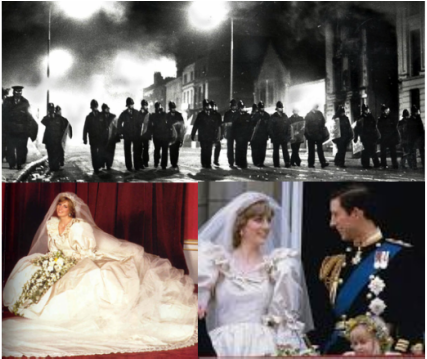
During the summer of 1981, Maxine had the first operation on the stump of her leg that she'd been waiting patiently for. This was to be an eventful month for the country and after the horrific sites of the Toxteth Riots on the 4th July, the 29th of July witnessed popular jubilation on the streets for the celebration of Prince Charles' and Princess Diana's wedding. Maxine had arranged to be away from home from July 29th for approximately four weeks. During her four weeks of absence, arrangements had been made for full-time private nursing care to be given to her mother at home.
The operation on Maxine's leg stump wasn't as successful as had initially been hoped, yet it was considered to have been of partial success and enough to build on with the prospect of another two or three operations on the stump over the years ahead. For the next month however, the stump flesh remained infected and she needed to change the balm covering twice a day instead of the usual once. Sean insisted on doing this for her.
During Maxine's absence from her home, her mother's condition had worsened and Mrs Cheevers was experiencing greater back pain and more frequent muscle spasms. The nurse had a word with the visiting doctor and he gave Mrs Cheevers a higher and stronger dosage of painkillers, administered into the blood stream by injections. Maxine was informed that her mother's condition had greatly worsened and because she was effectively losing the will to continue to battle her debilitating condition, Maxine was told that her mother would gradually slip away sometime before the coming Christmas.
The operation on Maxine's leg stump wasn't as successful as had initially been hoped, yet it was considered to have been of partial success and enough to build on with the prospect of another two or three operations on the stump over the years ahead. For the next month however, the stump flesh remained infected and she needed to change the balm covering twice a day instead of the usual once. Sean insisted on doing this for her.
During Maxine's absence from her home, her mother's condition had worsened and Mrs Cheevers was experiencing greater back pain and more frequent muscle spasms. The nurse had a word with the visiting doctor and he gave Mrs Cheevers a higher and stronger dosage of painkillers, administered into the blood stream by injections. Maxine was informed that her mother's condition had greatly worsened and because she was effectively losing the will to continue to battle her debilitating condition, Maxine was told that her mother would gradually slip away sometime before the coming Christmas.

Maxine effectively ignored any discomfort and pain, which her own body was constantly plagued with. She concerned herself full-time with her mother's growing level of physical discomfort and mental anguish at any lack of respite. Even the doctor's injections no longer seemed to provide sufficient pain relief for Sybil Cheevers and it pained Maxine to see her mother in so much physical agony without being able to offer her any relief.
Sean supported Maxine and her mother in any way that he could, but he seemed helpless to positively affect any outcome; indeed everyone did. Maxine had resorted to so much crying in the evenings that Sean gradually moved in so that he could be on hand every evening and throughout the night if needed.
Maxine couldn't bide to see her poor mother in so much pain and was downhearted with the medics not being able to offer any more help to ease her worsening suffering. Sean's full-time presence in the house essentially distracted Maxine's attention away from her ill mother part of the time, and while Sean considered this a good thing, it made Maxine feel guilty. To Maxine, it was as though she displayed a need to share her mother's pain. She needed to feel it in order to fully understand it. Sean occasionally wondered if focusing on her mother's pain took Maxine's mind off her own hurtful condition.
Sean supported Maxine and her mother in any way that he could, but he seemed helpless to positively affect any outcome; indeed everyone did. Maxine had resorted to so much crying in the evenings that Sean gradually moved in so that he could be on hand every evening and throughout the night if needed.
Maxine couldn't bide to see her poor mother in so much pain and was downhearted with the medics not being able to offer any more help to ease her worsening suffering. Sean's full-time presence in the house essentially distracted Maxine's attention away from her ill mother part of the time, and while Sean considered this a good thing, it made Maxine feel guilty. To Maxine, it was as though she displayed a need to share her mother's pain. She needed to feel it in order to fully understand it. Sean occasionally wondered if focusing on her mother's pain took Maxine's mind off her own hurtful condition.

As the health of Mrs Cheevers markedly worsened, she stopped eating solids virtually and her weight rapidly decreased in correspondence with a large increase in the levels of pain she felt. Maxine had taken to reading to her mother in bed, as this was the only thing that would get her to sleep most nights. As Maxine read to her mother, Sean would silently sit beside Maxine. There wasn't anything that he could do to ease Maxine's own pain and level of sadness apart from 'being there for her', which she greatly appreciated.
Mrs Cheevers loved the novels of Jane Austen and Elizabeth Gaskell, along with 'The Barchester Chronicles' by Anthony Trollope and it amazed Sean to see that even during moments of great pain and suffering, the educated classes could still derive pleasure from hearing the spoken words of authors who'd lived in a time of greater suffering and who'd been dead for a century or more!
Mrs Cheevers loved the novels of Jane Austen and Elizabeth Gaskell, along with 'The Barchester Chronicles' by Anthony Trollope and it amazed Sean to see that even during moments of great pain and suffering, the educated classes could still derive pleasure from hearing the spoken words of authors who'd lived in a time of greater suffering and who'd been dead for a century or more!

That Christmas of 1981 was one of the saddest that Maxine had ever experienced. The doctor had told her two days after Boxing Day that her mother had contracted pneumonia and was getting weaker by the hour and hadn't long left to live. He asked if she would like her to enter a hospice, but Maxine wouldn't hear of such a thing. Upon leaving, the doctor left Maxine a bottle that contained a liquid morphine to ease her mother's pain when it became unbearable, but stressed that she should only administer it in the prescribed dosage, if and as required. As fussy as always, her mother refused to touch the stuff until the bottle's contents had been transferred into her own cut glass dispensing bottle; just as if she had been decanting a good bottle of wine instead of drinking it straight from bottle to glass! Even in the matter of taking her own medicine, Sybil Cheevers remained a snob.
That weekend, Mrs Cheevers begged Maxine to 'end it' for her and to put her out of her misery by simply leaving the morphine bottle at her bedside with its top off. Initially Maxine wouldn't consider the request with any degree of seriousness, but as the evening went by and her mother begged her to end her misery, she started to momentarily weaken in resolve and then eventually relented. She knew that she wouldn't have allowed any beast or wildest of creatures to have to endure such pain had she possessed the means to kill them mercifully, and therefore she asked herself how could she refuse the earnest pleas made by a loving mother who still possessed her mental faculties to know the gravity of what she begged her daughter to do? Maxine wished that Sean had been there to support and guide her that early evening, but he had other matters to attend to regarding his daily work.
That weekend, Mrs Cheevers begged Maxine to 'end it' for her and to put her out of her misery by simply leaving the morphine bottle at her bedside with its top off. Initially Maxine wouldn't consider the request with any degree of seriousness, but as the evening went by and her mother begged her to end her misery, she started to momentarily weaken in resolve and then eventually relented. She knew that she wouldn't have allowed any beast or wildest of creatures to have to endure such pain had she possessed the means to kill them mercifully, and therefore she asked herself how could she refuse the earnest pleas made by a loving mother who still possessed her mental faculties to know the gravity of what she begged her daughter to do? Maxine wished that Sean had been there to support and guide her that early evening, but he had other matters to attend to regarding his daily work.

By the time that Sean had returned from his task to Maxine and her mother, he found Maxine at the side of her mother's bed sobbing bitterly and saying, "I love you Mum. I love you. God rest your soul. No more pain!"
Maxine was holding the morphine bottle tightly. The bottle was empty and looking at the corpse of her mother, Sean realised what Maxine had done. Taking the empty bottle from Maxine's hand, he wiped it clean and placed it back on the bedside table, before clasping the hands of the tearful Maxine. Then placing his arms around Maxine's shoulders, he kissed her tenderly on the cheek. No words were spoken between the couple as to what had transpired in the room during his absence. It wasn't necessary, as each knew.
Maxine was holding the morphine bottle tightly. The bottle was empty and looking at the corpse of her mother, Sean realised what Maxine had done. Taking the empty bottle from Maxine's hand, he wiped it clean and placed it back on the bedside table, before clasping the hands of the tearful Maxine. Then placing his arms around Maxine's shoulders, he kissed her tenderly on the cheek. No words were spoken between the couple as to what had transpired in the room during his absence. It wasn't necessary, as each knew.

Sean's mind was the first to re-engage itself back into logical thought. He knew that someone needed to be informed that Mrs Cheevers was dead and instantly thought about phoning the doctor. When the doctor came around some fifteen minutes later, he instantly realised what had happened when he saw the empty morphine bottle at the side of Mrs Cheevers' bed where Sean had replaced it. Upon leaving, he politely informed Maxine, "I'm so sorry for your loss, but I shall have to inform the police, I'm afraid. It's customary in such circumstances. It's the law, you see!"
Neither Maxine nor Sean replied. Instead, they just sat quietly as Maxine held her mother's hand and Sean caressed Maxine's shoulders as she started to weep uncontrollably again. Two men from the police eventually came around to the house half an hour later and Sean let them in; one of them was a Superintendent from the Manchester CID. Upon their arrival, the doctor who'd remained outside the house throughout, informed them of his findings and returned to his clinical rounds.
Neither Maxine nor Sean replied. Instead, they just sat quietly as Maxine held her mother's hand and Sean caressed Maxine's shoulders as she started to weep uncontrollably again. Two men from the police eventually came around to the house half an hour later and Sean let them in; one of them was a Superintendent from the Manchester CID. Upon their arrival, the doctor who'd remained outside the house throughout, informed them of his findings and returned to his clinical rounds.

The two police men entered Mrs Cheevers' bedroom and after establishing the identity of Maxine and Sean and their connection to the dead woman, the senior officer formally cautioned both of them and said, "Tell us what happened here."
Maxine tried to speak, but felt as though her throat had been twice pierced through with a pronged fork, which had damaged her voice box, preventing the utterance of any audible sound from her mouth. She couldn't get out the words to tell them amid all her tears, so Sean interjected to spare his love any further suffering. He had quickly realised the course of action that the police would pursue upon their arrival and that was why he'd already wiped the empty morphine bottle clean of all prints apart from his own before replacing it at the side of Mrs Cheevers' bed.
Sean knew how hard it must have been for Maxine to comply with her mother's wishes and do what she felt necessary to do in order to instantly relieve her from all further suffering and pain. He also felt that whilst it was possible for her to escape the serving of a prison sentence for the mercy killing of her dying mother, there was no certainty that this would turn out to be the case, given all the vagaries of the British justice system. So often, he had read about patently bad offenders getting light treatment at the hands of the Court and basically good offenders getting sent to prison for an offence that clearly didn't warrant it!
Sean wasn't prepared to take that chance with the British justice system. Were Maxine imprisoned, the experience would destroy her. It would also prevent her receiving the further leg operations that she needed on her stump before a prosthesis could be fitted to enable her to walk again. So before Maxine was able to reply, Sean gently squeezed her hand and said to the police man, "It's me you need to question. I'm the one who assisted Mrs Cheevers to die. She begged us both to do it, but when it came to it, her daughter couldn't. So seeing the amount of suffering she was experiencing, I opened the morphine bottle and placed it to her mouth. After she'd emptied it, Mrs Cheevers passed away and I replaced the bottle on the side-table over there. Before I passed Mrs Cheevers the bottle, I inadvertently wet the outside of it, so I wiped it dry and placed it to her mouth. You'll find my prints on the bottle if you check; mine, nobody else's!"
"Is this true?" the senior officer asked Maxine.
Maxine remained crying and uttered no words as she looked towards Sean for guidance.
Maxine tried to speak, but felt as though her throat had been twice pierced through with a pronged fork, which had damaged her voice box, preventing the utterance of any audible sound from her mouth. She couldn't get out the words to tell them amid all her tears, so Sean interjected to spare his love any further suffering. He had quickly realised the course of action that the police would pursue upon their arrival and that was why he'd already wiped the empty morphine bottle clean of all prints apart from his own before replacing it at the side of Mrs Cheevers' bed.
Sean knew how hard it must have been for Maxine to comply with her mother's wishes and do what she felt necessary to do in order to instantly relieve her from all further suffering and pain. He also felt that whilst it was possible for her to escape the serving of a prison sentence for the mercy killing of her dying mother, there was no certainty that this would turn out to be the case, given all the vagaries of the British justice system. So often, he had read about patently bad offenders getting light treatment at the hands of the Court and basically good offenders getting sent to prison for an offence that clearly didn't warrant it!
Sean wasn't prepared to take that chance with the British justice system. Were Maxine imprisoned, the experience would destroy her. It would also prevent her receiving the further leg operations that she needed on her stump before a prosthesis could be fitted to enable her to walk again. So before Maxine was able to reply, Sean gently squeezed her hand and said to the police man, "It's me you need to question. I'm the one who assisted Mrs Cheevers to die. She begged us both to do it, but when it came to it, her daughter couldn't. So seeing the amount of suffering she was experiencing, I opened the morphine bottle and placed it to her mouth. After she'd emptied it, Mrs Cheevers passed away and I replaced the bottle on the side-table over there. Before I passed Mrs Cheevers the bottle, I inadvertently wet the outside of it, so I wiped it dry and placed it to her mouth. You'll find my prints on the bottle if you check; mine, nobody else's!"
"Is this true?" the senior officer asked Maxine.
Maxine remained crying and uttered no words as she looked towards Sean for guidance.

The officer then re-read Sean his rights and formally arrested him for the manslaughter of Mrs. Cheevers. Maxine tried to protest, to tell them what she'd done, but she seemed unable to speak. She was like an horrific crime victim or crash survivor experiencing total shock and loss of voice. Sean smiled at her reassuringly as the two police officers led him away from the house in handcuffs.
"I'll see you soon, Maxine. Hold on, sweetheart," Sean uttered as he was led away from the house and taken to the police station for the night.
"I'll see you soon, Maxine. Hold on, sweetheart," Sean uttered as he was led away from the house and taken to the police station for the night.

Sean was initially taken to the Salford Police Station in Division 'F' and after being produced before the local Magistrate's Court the following morning, he was committed to Crown Court for trial and sentence. Because of the fact that he only been a resident in England for just a few years and had an Irish passport, he was considered to be too high a risk for absconding were he released on bail. This was a decade on the English mainland where any person with an Irish accent was suspected as being a wrong one, a potential bomber or at the very least, an IRA sympathiser. Having refused to be represented by a solicitor, Sean wasn't surprised to find himself being remanded in custody until he was next produced before the court. Sean was sent to spend his period of remand in Her Majesty's Prison, Armley, Leeds.
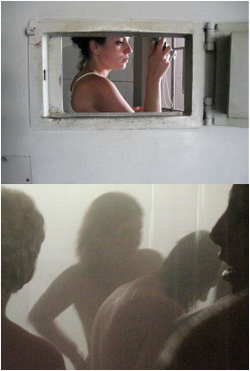
Sean was worried to death how Maxine would cope on the outside without him. Over the past two years, she had allowed herself to become more emotionally and physically dependent on Sean than she had been on any other person since the bombing. Also, Sean needed to speak with her before his eventual court hearing so that they could get their stories water tight. He didn't want Maxine making any incriminating statement or placing herself in any position which would implicate her in the offence of manslaughter.
Sean knew that any female of Maxine's breeding and upbringing would be treated less favourably than dog meat by the women inmates of too many prisons, if she were to find herself behind bars. And besides, to imagine what they'd do to a one-legged prison rookie of attractive looks in a communal shower was simply unthinkable! Sean knew it would literally kill Maxine to serve hard time in an English prison and that she'd never be able to readjust to the strict and barbaric regime of some establishments.
Sean knew that any female of Maxine's breeding and upbringing would be treated less favourably than dog meat by the women inmates of too many prisons, if she were to find herself behind bars. And besides, to imagine what they'd do to a one-legged prison rookie of attractive looks in a communal shower was simply unthinkable! Sean knew it would literally kill Maxine to serve hard time in an English prison and that she'd never be able to readjust to the strict and barbaric regime of some establishments.
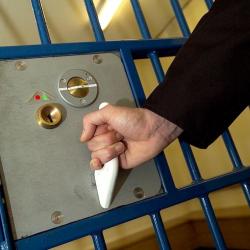
The very first opportunity he had, Sean phoned Maxine. Three days had passed by since he'd been remanded in custody and five days since his arrest. After trying Maxine's number three times, he concluded that the line was dead. There was either a fault on it or it had been disconnected. Sean started to worry. Not knowing what had happened and where Maxine was, had started to drive him mad. He was also curious why she'd made no contact with him over the past five days.
Sean sensed that something was sadly amiss and he dearly needed to know. For the first time since Sarah had run out on their relationship, Sean was again feeling distinctly helpless. He was unable to do anything to discover where Maxine was. For one brief moment, he even considered if Maxine had been the real McCoy and whether or not he had been skilfully played for a sucker by her; having willingly taken the blame for her wrong doing. He needed to see her. He needed some news that would better inform his increasing doubts and lay waste to his worse fears!
Sean sensed that something was sadly amiss and he dearly needed to know. For the first time since Sarah had run out on their relationship, Sean was again feeling distinctly helpless. He was unable to do anything to discover where Maxine was. For one brief moment, he even considered if Maxine had been the real McCoy and whether or not he had been skilfully played for a sucker by her; having willingly taken the blame for her wrong doing. He needed to see her. He needed some news that would better inform his increasing doubts and lay waste to his worse fears!

Sean wrote to the surgery from which the doctor had made the house call on the evening of Mrs Cleevers' death, but as a witness in the trial to come, the GP was prevented from making any manner of communication with the defendant. He also wrote to the arresting police officers, but didn't even receive an acknowledgement of his communication from them. It was a full three months after his initial remand in custody before Sean was able to find out anything at all. Maxine had attended none of his new remand hearings or had initiated any form of contact with him and this ignorance and helplessness he now felt himself firmly wrapped up in was torturing all memory of good times past.
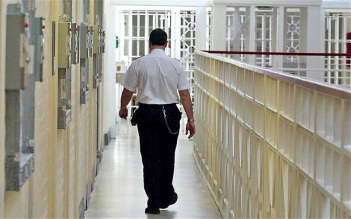
Sean's new information gatherer came in the form of a bent screw who had worked as a prison guard for nearly twenty years and would do a 'favour' for inmates he could trust; naturally for a price that corresponded with the degree of risk he needed to take. He would deliver an unopened and uncensored letter to an outside post box for £20, bring one in for an inmate for £30, or even bring in a bit of drugs for £100. The prison guard in question was the front man who negotiated with the prisoner wanting a 'favour' and his guarantee against the inmate ever ratting on him were his 'sleeping partners', who were two other unidentified guards who would take their own delightful manner of revenge on anyone who crossed the crooked syndicate. Twice previously, an inmate had squealed on a crooked guard. One found himself being gang-raped by a group of 'prison pussy' as they were known and the other was found hanging in his cell while the two inmates he shared the cell with reportedly slept on undisturbed.
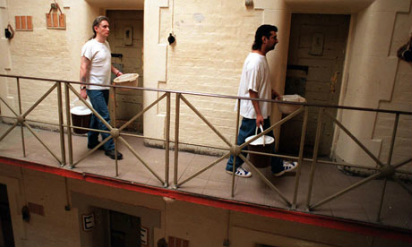
Sean had been arrested with very little money on his person and although he could have written to his mother for some, he'd no intention of making any contact with his family in Portlaw again until he was back on the outside of prison walls. He had £16 to offer the prison guard to put a letter from himself inside Maxine's letterbox and to try and ascertain if she was still living there, or obtain any other news of worth. Normally, the prison guard would have refused to accept a lesser amount than the usual fee of £20 from an inmate, but given that Sean was a man of previous good record on remand for the mercy killing of a woman who had but mere months to live, he didn't view Sean as he did the other prison lags who clearly deserved to find themselves locked up again for the umpteenth time. Sean gave the guard the letter he wanted passing on to Maxine during the morning round of slopping out, a practice that still existed in most British prisons way up into the 1990s.

With leave days off owing to the guard, Sean didn't see the prison guard again for sixteen days, during which Maxine had still not contacted him. During this past sixteen days, one of Sean's cellmates had been brutally attacked and scarred by another inmate. A new Governor of the prison had been appointed and had taken up his post. The new Governor had given a press interview indicating that he intended to come down hard on any irregularities he found either guards or inmates indulging in.
What this new Governor, like all other new Governors to any prison hadn't yet appreciated, was the fact that it was the guards who effectively ran the prisons and not the Governors; and it was the prisoners who effectively enabled the guards to function at all! The Governors exercised their control through the silent cooperation of the prison guards and the prison guards, in turn, only effectively operated through the compliance of the prison population not to riot or engage in mass protest! Only through this prison conspiracy from Home Office Minister down to the prison red bands was it possible for any semblance of order in any prison in the land to exist at all!
Thus, it was in the interest of all concerned that in order to achieve peace in prison through inmate compliance, cooperating with a number of prisoner irregularities and turning a blind eye to a number of other prison customs like drug taking, prisoner assaults on sexual offenders, along with other breaches of prison rules were allowed to continue. Without this tacit agreement between the prisoners and the screws, no prison establishment of over one thousand inmates could ever be effectively managed and controlled with fewer than the hundred prison staff that worked there! As for the Prison Governor, he or she was no more than a 'figure head'; a whipping boy to answer to the press and to have his or her backside kicked in public if ever the prisoners rioted, escaped or committed suicide while supposedly under constant prison watch, which they often did.
Little did the public or the Prison Governor realise that the two-foot thick walls around Armley Prison was to keep the full power of the Prison Officer's Association inside, along with all the inmates; whilst keeping out all those progressive advancements that other countries such as Holland had introduced: civilised changes such as the abolition of piss pots or a slop buckets in a cell and the right to wear one's own clothing and have conjugal visiting rights for lifers.
What this new Governor, like all other new Governors to any prison hadn't yet appreciated, was the fact that it was the guards who effectively ran the prisons and not the Governors; and it was the prisoners who effectively enabled the guards to function at all! The Governors exercised their control through the silent cooperation of the prison guards and the prison guards, in turn, only effectively operated through the compliance of the prison population not to riot or engage in mass protest! Only through this prison conspiracy from Home Office Minister down to the prison red bands was it possible for any semblance of order in any prison in the land to exist at all!
Thus, it was in the interest of all concerned that in order to achieve peace in prison through inmate compliance, cooperating with a number of prisoner irregularities and turning a blind eye to a number of other prison customs like drug taking, prisoner assaults on sexual offenders, along with other breaches of prison rules were allowed to continue. Without this tacit agreement between the prisoners and the screws, no prison establishment of over one thousand inmates could ever be effectively managed and controlled with fewer than the hundred prison staff that worked there! As for the Prison Governor, he or she was no more than a 'figure head'; a whipping boy to answer to the press and to have his or her backside kicked in public if ever the prisoners rioted, escaped or committed suicide while supposedly under constant prison watch, which they often did.
Little did the public or the Prison Governor realise that the two-foot thick walls around Armley Prison was to keep the full power of the Prison Officer's Association inside, along with all the inmates; whilst keeping out all those progressive advancements that other countries such as Holland had introduced: civilised changes such as the abolition of piss pots or a slop buckets in a cell and the right to wear one's own clothing and have conjugal visiting rights for lifers.

When Guard Evans returned to duty, he found Sean and told him what he'd learned.
"She no longer lives at the address you gave me," he told Sean. "The neighbour to her right said that the house had been put up for sale with Holdens Estate agents. I checked with the estate agent as a pretend buyer and was told that due to a family bereavement, the previous owner of the property had moved down......................."
The prison officer abruptly stopped and when an eager Sean asked, "Where?" the officer said, "I've done more than enough. I've already given you cut-rate terms. If you want the rest I found out, it will cost you another £50 and the £4 you owe me."
"Tell me," pleaded Sean, adding, "I'll see that you get your money, honest I will."
"I'm sure you will, Fanning," Officer Evans replied, "and when you do, I'll see that you get the rest of what I know!"
"She no longer lives at the address you gave me," he told Sean. "The neighbour to her right said that the house had been put up for sale with Holdens Estate agents. I checked with the estate agent as a pretend buyer and was told that due to a family bereavement, the previous owner of the property had moved down......................."
The prison officer abruptly stopped and when an eager Sean asked, "Where?" the officer said, "I've done more than enough. I've already given you cut-rate terms. If you want the rest I found out, it will cost you another £50 and the £4 you owe me."
"Tell me," pleaded Sean, adding, "I'll see that you get your money, honest I will."
"I'm sure you will, Fanning," Officer Evans replied, "and when you do, I'll see that you get the rest of what I know!"

With no prison wages to earn while on remand and no way of getting any more money sent in from the outside without revealing that he was locked up in Armley Prison, Sean did the only thing he could bring himself to do to earn the £54 required by prison guard Evans.
He agreed to plant a blade upon another inmate who had run foul of some tobacco barons and whom they now planned to stitch up in revenge as a warning to be sent out to all other inmates who welshed on their agreed payments to the prison bosses. Sean planted the knife under the inmate's mattress. He was able to get access to the cell unnoticed as remand prisoners were given more freedom of movement around the floors than sentenced prisoners were. Hence, it was the remand prisoners who had the most to lose if they got discovered and therefore it was those prisoners on remand who the convicted prisoners would often try to use to get stuff brought in or taken out with them.
Out of every two blades or any other weapon stashed inside an inmate's cell, prison cell searches would manage to retrieve approximately half. The hardened prisoners frequently saw to it that many a remand prisoner who was indeed innocent upon entry into prison at the pre-trial stage, was guilty of some other offence before they eventually had their day in court.
He agreed to plant a blade upon another inmate who had run foul of some tobacco barons and whom they now planned to stitch up in revenge as a warning to be sent out to all other inmates who welshed on their agreed payments to the prison bosses. Sean planted the knife under the inmate's mattress. He was able to get access to the cell unnoticed as remand prisoners were given more freedom of movement around the floors than sentenced prisoners were. Hence, it was the remand prisoners who had the most to lose if they got discovered and therefore it was those prisoners on remand who the convicted prisoners would often try to use to get stuff brought in or taken out with them.
Out of every two blades or any other weapon stashed inside an inmate's cell, prison cell searches would manage to retrieve approximately half. The hardened prisoners frequently saw to it that many a remand prisoner who was indeed innocent upon entry into prison at the pre-trial stage, was guilty of some other offence before they eventually had their day in court.

After the blade had been planted by Sean, the prison guards got a tip off and the planted inmate got banged up in solitary confinement for the next two weeks, plus his loss of all privileges. In addition to getting sent down to solitary confinement, the plant would invariably receive an additional six months added on to his original time served. This would provide the debtor with the time and means to pay back the tobacco barons. As for Sean, he was now able to pay for the remaining information that Guard Evans had been holding out on him.
At least, the information provided by the guard seemed bona fide, but obtaining it had left Sean beholden to the tobacco barons that he'd initially planted the blade for. Two weeks later, the day before his next remand hearing adjournment, Sean was informed that the planted knife that he'd put under the inmate's mattress had been retrieved by one of the friendly guards on the baron's payroll and was now available 'for sale, with Sean's finger prints being the only prints on it!'
Sean realised that he was being shafted and set up for another sting. He seriously started to fear for his own continued safety at Armley if he crossed the prison barons. He also feared for his safety if he was returned to Armley after his sentence. Had someone offered to smuggle him out of the prison in a suitcase, he would have considered that risk as being less than it was remaining on the open wing until his eventual date of sentence. So, Sean got off the open wing the only way he could.
At least, the information provided by the guard seemed bona fide, but obtaining it had left Sean beholden to the tobacco barons that he'd initially planted the blade for. Two weeks later, the day before his next remand hearing adjournment, Sean was informed that the planted knife that he'd put under the inmate's mattress had been retrieved by one of the friendly guards on the baron's payroll and was now available 'for sale, with Sean's finger prints being the only prints on it!'
Sean realised that he was being shafted and set up for another sting. He seriously started to fear for his own continued safety at Armley if he crossed the prison barons. He also feared for his safety if he was returned to Armley after his sentence. Had someone offered to smuggle him out of the prison in a suitcase, he would have considered that risk as being less than it was remaining on the open wing until his eventual date of sentence. So, Sean got off the open wing the only way he could.

Sean realised that the other inmate hadn't been the only one to be 'planted' by the prison barons and he could sense that his continued presence in Armley would leave him wide open to all manner of on-going blackmail which would be employed whenever others decided the time to be ripe. So he immediately placed himself on 'Rule 43' and was prepared to stay mixed up with the child perverts, sex offenders and rapists instead of staying on in the open wing and having the 'Sword of Damocles' hung over him until the barons decided to cut off his head.
He considered it safer to be confined with the sex offenders and perverts than to finish up as just another unexplained death statistic after lights out! He didn't want to have his body discovered in his shared cell one night as he hung from the window bars and have his death written off as just one more prison suicide that Armley was accustomed to. Neither had he any intention of being found stabbed to death in the showers any time that the barons decided to strike.
He considered it safer to be confined with the sex offenders and perverts than to finish up as just another unexplained death statistic after lights out! He didn't want to have his body discovered in his shared cell one night as he hung from the window bars and have his death written off as just one more prison suicide that Armley was accustomed to. Neither had he any intention of being found stabbed to death in the showers any time that the barons decided to strike.

Guard Evans had told Sean that the estate agent who was selling the home of Maxine's mother had told him that the vendor had moved down to Aylesbury in Buckinghamshire. This made sense to Sean, as the town of Aylesbury was less than two miles in distance from Stoke Mandeville Hospital, the place where she hoped to finish up at. He still couldn't understand however, why Maxine had made no contact with him since that fatal night of their recent parting. It didn't make any sense to Sean, as he was convinced that her affections for him had been wholly genuine throughout the entirety of their relationship, as were his feelings for her.
Then he started to consider whether the police had got Maxine to make a statement that could be used against him in order to guarantee a conviction. He started to suspect that the police had made Maxine a witness for the prosecution as this prevented her having any pre-trial contact with him, the defendant. At least that made some sort of sense and provided Sean with a plausible explanation for the nil contact over the past months.
Sean had learnt much about court proceedings during his stay on remand. He had been told by the old prison lags that the police could treat Maxine as 'a hostile witness' if it proved necessary. He learned that the police could portray her to the court as being someone who was frightened and unprepared to give any evidence against her former lover. This would provide the police with a valid reason for keeping Sean and Maxine apart until after his sentence, besides enabling the police to enter into evidence, certain details that Maxine refused to either confirm or deny, on the grounds that to answer might incriminate her and violate her rights. His absence of all contact with Maxine worried Sean considerably. Like being obliged to shave dry in prison, something that he disliked immensely, he simply had to grin and bear it until his eventual release.
Then he started to consider whether the police had got Maxine to make a statement that could be used against him in order to guarantee a conviction. He started to suspect that the police had made Maxine a witness for the prosecution as this prevented her having any pre-trial contact with him, the defendant. At least that made some sort of sense and provided Sean with a plausible explanation for the nil contact over the past months.
Sean had learnt much about court proceedings during his stay on remand. He had been told by the old prison lags that the police could treat Maxine as 'a hostile witness' if it proved necessary. He learned that the police could portray her to the court as being someone who was frightened and unprepared to give any evidence against her former lover. This would provide the police with a valid reason for keeping Sean and Maxine apart until after his sentence, besides enabling the police to enter into evidence, certain details that Maxine refused to either confirm or deny, on the grounds that to answer might incriminate her and violate her rights. His absence of all contact with Maxine worried Sean considerably. Like being obliged to shave dry in prison, something that he disliked immensely, he simply had to grin and bear it until his eventual release.

Nine full months after his arrest on the offence of manslaughter, Sean appeared for trial before the Manchester Crown Court. It was September, 1982 and he'd even had his 21st, birthday in prison whilst on remand. This was the only birthday he'd never received a card. His hearing lasted two and a half days and given the overcrowding of the prisons at the time, he was held overnight in the police cells until being returned to prison after sentence.
He looked forward to catching sight of his beloved Maxine in court and whatever she might say against him or didn't say, he had not the slightest intention of incriminating her. As Sean entered the Court from the police cells below, he looked all around for Maxine or indeed any friendly face he knew by sight, but saw nobody he recognised.
Upon being asked how he pleaded, his barrister looked across at Sean and he replied, "Guilty!" After entering a plea of guilty to the offence of manslaughter, Sean was asked to sit down in the defendant's box between two prison guards. With no need to select and swear in a jury, the presiding judge looked most relieved. This led any court observer to suspect that the learned judge and the barristers were now considering how they could best use their spare time as the case would not be too long with a 'Guilty' plea having been tendered and justice could be speedily dispensed. It was anticipated that the case would take two days minimum and three days maximum to hear.
He looked forward to catching sight of his beloved Maxine in court and whatever she might say against him or didn't say, he had not the slightest intention of incriminating her. As Sean entered the Court from the police cells below, he looked all around for Maxine or indeed any friendly face he knew by sight, but saw nobody he recognised.
Upon being asked how he pleaded, his barrister looked across at Sean and he replied, "Guilty!" After entering a plea of guilty to the offence of manslaughter, Sean was asked to sit down in the defendant's box between two prison guards. With no need to select and swear in a jury, the presiding judge looked most relieved. This led any court observer to suspect that the learned judge and the barristers were now considering how they could best use their spare time as the case would not be too long with a 'Guilty' plea having been tendered and justice could be speedily dispensed. It was anticipated that the case would take two days minimum and three days maximum to hear.

With a guilty plea having been tendered and only two police officers, one doctor and the part-time private nurse who had looked after Mrs Cheevers to give uncontested and factual evidence, the only other evidence that was accepted without contest was a signed police statement by Maxine Cheevers that would be read out and entered as court evidence at the appropriate stage of the hearing.
After the evidence from the witnesses had been heard and largely accepted, the prosecution barrister made his closing remarks. Sean saw the irony in the fact that while he could hear the words of the barrister for the Prosecution addressing the judge, all he could see during his full summing up was the back of his wigged head.
"I'll keep my closing comments brief, Your Honour, as this is a straight forward case that presents no areas where the evidence of the act is questioned. It is an offence of Manslaughter that is admitted by the defendant, an offence which he admits to carrying out alone."
"I'm aware that some of the public may view this type of action more with compassion than remorse, but I nevertheless respectfully remind the court that it remains an offence on the statute books, even were it to be executed by the medical profession itself, which it wasn't. For the defendant to have administered a dose of morphine to Mrs Cheevers in the full knowledge that as a result of her having ingested such a dosage, her death would inevitably follow, is not too distant an act to that of pre-meditated murder! I know that the learned counsel for the defence will seek to mitigate the defendant's actions by reminding the court that Mrs Cheevers pleaded to have the lethal dosage of morphine administered to her, but I would equally say that even if the said patient was of sound mind and had clearly requested assistance from any other to help her to end her life, it was not, nor could ever be, the prerogative of the defendant or any other person to go ahead and take it!"
"In conclusion, the court will note that the counsel for the defence has not chosen to have the defendant enter the witness box. This of course means that he cannot be cross-examined on oath as to his full reasoning and actions on that fatal night. I know that Your Honour will take that into full consideration when you deliberate sentence, and even though it is the defendant's right not to open himself up to full cross-examination and the scrutiny of his actual motives, the court should ask itself, what is he refusing to divulge? For all we, both court and public know, or shall ever know (to be more to the point), is only what we have directly heard in this hearing from those who chose to enter the witness box. We will never know when the defendant did what he did, that he acted alone and without the foreknowledge of another. I ask that Your Honour see the defendant for no less than how he truly deserves to be seen; as a person who gave himself the right to kill another human being. I respectfully ask that he be given a weighty prison sentence to match his heinous crime."
After the prosecuting barrister had sat down, the barrister for the defence stood to address the judge. Sean's only defence that would be put forward was the degree of mitigation, which his barrister was permitted to place before the judge. His words identified the following that he wanted the judge to take into consideration, along with his 'guilty plea' before sentencing him.
"Your Honour, this was, to put it simply, an action done out of basic humanity by the defendant. We have heard medical testament that Mrs Cheevers only had mere weeks or a month left to live. Because of her unbearable pain, which has never been placed in doubt before this court, and whilst still very much of sound mind, she asked, nay indeed, 'begged' her daughter to assist her to end her life. I repeat, Your Honour, 'she begged' to be administered the fatal dose! While the daughter could not, her boyfriend and lover, Sean Fanning, out of his love for both parties, did so instead. He administered the bottle of morphine to Mrs Cheevers, knowing full well that his assistance would undoubtedly lead to her immediate death. A death, I echo, she welcomed and had 'begged for' and one that was complied with by the defendant. I say that even though this act by the defendant is punishable as a crime of manslaughter, most people attending this court today or reading about this case in tomorrow's newspapers, will probably judge the act as being an act borne out of love for the deceased, as being an act of mercy. This was an act committed by a loved-one out of nothing less than basic humanity and an inability to see the poor woman wracked with pain suffer one minute longer than was absolutely necessary. I deliberately advised my client not to go into the witness box because I could not see anything further to be gained by such an action. Your Honour has his plea, along with sufficient evidence to suggest that in the overall scale of offences of manslaughter, the defendant's offence comes in the bottom half of the scale as opposed to the top half. I rest my case and I ask Your Honour to exercise as much leniency in sentencing the defendant as you feel fit to pass upon a man of previous unblemished character."
After the evidence from the witnesses had been heard and largely accepted, the prosecution barrister made his closing remarks. Sean saw the irony in the fact that while he could hear the words of the barrister for the Prosecution addressing the judge, all he could see during his full summing up was the back of his wigged head.
"I'll keep my closing comments brief, Your Honour, as this is a straight forward case that presents no areas where the evidence of the act is questioned. It is an offence of Manslaughter that is admitted by the defendant, an offence which he admits to carrying out alone."
"I'm aware that some of the public may view this type of action more with compassion than remorse, but I nevertheless respectfully remind the court that it remains an offence on the statute books, even were it to be executed by the medical profession itself, which it wasn't. For the defendant to have administered a dose of morphine to Mrs Cheevers in the full knowledge that as a result of her having ingested such a dosage, her death would inevitably follow, is not too distant an act to that of pre-meditated murder! I know that the learned counsel for the defence will seek to mitigate the defendant's actions by reminding the court that Mrs Cheevers pleaded to have the lethal dosage of morphine administered to her, but I would equally say that even if the said patient was of sound mind and had clearly requested assistance from any other to help her to end her life, it was not, nor could ever be, the prerogative of the defendant or any other person to go ahead and take it!"
"In conclusion, the court will note that the counsel for the defence has not chosen to have the defendant enter the witness box. This of course means that he cannot be cross-examined on oath as to his full reasoning and actions on that fatal night. I know that Your Honour will take that into full consideration when you deliberate sentence, and even though it is the defendant's right not to open himself up to full cross-examination and the scrutiny of his actual motives, the court should ask itself, what is he refusing to divulge? For all we, both court and public know, or shall ever know (to be more to the point), is only what we have directly heard in this hearing from those who chose to enter the witness box. We will never know when the defendant did what he did, that he acted alone and without the foreknowledge of another. I ask that Your Honour see the defendant for no less than how he truly deserves to be seen; as a person who gave himself the right to kill another human being. I respectfully ask that he be given a weighty prison sentence to match his heinous crime."
After the prosecuting barrister had sat down, the barrister for the defence stood to address the judge. Sean's only defence that would be put forward was the degree of mitigation, which his barrister was permitted to place before the judge. His words identified the following that he wanted the judge to take into consideration, along with his 'guilty plea' before sentencing him.
"Your Honour, this was, to put it simply, an action done out of basic humanity by the defendant. We have heard medical testament that Mrs Cheevers only had mere weeks or a month left to live. Because of her unbearable pain, which has never been placed in doubt before this court, and whilst still very much of sound mind, she asked, nay indeed, 'begged' her daughter to assist her to end her life. I repeat, Your Honour, 'she begged' to be administered the fatal dose! While the daughter could not, her boyfriend and lover, Sean Fanning, out of his love for both parties, did so instead. He administered the bottle of morphine to Mrs Cheevers, knowing full well that his assistance would undoubtedly lead to her immediate death. A death, I echo, she welcomed and had 'begged for' and one that was complied with by the defendant. I say that even though this act by the defendant is punishable as a crime of manslaughter, most people attending this court today or reading about this case in tomorrow's newspapers, will probably judge the act as being an act borne out of love for the deceased, as being an act of mercy. This was an act committed by a loved-one out of nothing less than basic humanity and an inability to see the poor woman wracked with pain suffer one minute longer than was absolutely necessary. I deliberately advised my client not to go into the witness box because I could not see anything further to be gained by such an action. Your Honour has his plea, along with sufficient evidence to suggest that in the overall scale of offences of manslaughter, the defendant's offence comes in the bottom half of the scale as opposed to the top half. I rest my case and I ask Your Honour to exercise as much leniency in sentencing the defendant as you feel fit to pass upon a man of previous unblemished character."
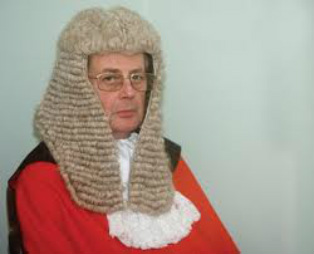
After both barristers had completed their closing speeches and had resumed their seats, the judge decided to adjourn until 2.00 pm when he would return and deliberate his verdict. He warned Sean to be prepared to receive a prison sentence. Sean was offered a lunch in the holding cell beneath the Crown Court, but declined. The two-hour interval between the adjournment at noon and 2pm dragged for Sean. He wondered what had happened to Maxine, especially as her ill health had prevented her from being at court. He determined to ask his barrister when he next saw him, what the precise manner of her illness was.

When the Crown Court resumed in the afternoon to pass sentence, Sean's barrister had hoped that he might get less than a three-year prison sentence. With time off for good remission and the possibility of parole, he indicated to Sean that he could hopefully be out in eighteen months. As Sean stood to receive his sentence, he could tell that it had been the prosecution barrister who had best commanded the judge's ear.
The judge looked directly at Sean and the look of distaste that filled his face was no less than if Sean and the judge's daughter been found in a state of nakedness by an indignant and over-possessive father. In that upper-class way that a country squire might look down at a peasant he'd caught poaching, Judge Hartley looked at Sean and said, "Having heard all the evidence presented and the arguments for both sides, I am clearly of the view that this offence was a more calculating act by the defendant (with or without the accompaniment of another), than the usual offence of manslaughter which invariably happens through negligence or sheer accident. This act of taking the life of another was done deliberately by the defendant. He assumed full responsibility for his actions, and despite giving him credit for his 'guilty plea' and having saved the tax payer considerable expense by not having put the issue to the time and cost of a full trial, I must nevertheless mark the gravity of the taking of a life. If only one clear message leaves this court today, I want it to be this. 'No one', I repeat 'no one' on earth has the right to take the life of another, under any circumstances outside government-sanctioned war or an Act of Parliament. I do not believe that the Court has had all of the facts placed before it that would have better identified the defendant's true motive at the time of the commission of the offence. Indeed, I would venture to say that had it been in my power to do so, the sentence I am now about to pass would have been infinitely greater in length. Sean Fanning, I sentence you to six years imprisonment and note that you serve at least half this term before being considered for release. Take the prisoner down."
As Sean heard 'six years' he held his head in his hands before being led away to the holding cells below the court.
"All stand in court for His Honour, Judge Hartley," the Clerk to Court announced loudly, bringing the hearing and the day's court proceedings to an end. Sean was taken down to the holding cell beneath the court. His barrister, Jeremy Black, said he'd pop down and see him before he was taken away to serve his sentence.
The judge looked directly at Sean and the look of distaste that filled his face was no less than if Sean and the judge's daughter been found in a state of nakedness by an indignant and over-possessive father. In that upper-class way that a country squire might look down at a peasant he'd caught poaching, Judge Hartley looked at Sean and said, "Having heard all the evidence presented and the arguments for both sides, I am clearly of the view that this offence was a more calculating act by the defendant (with or without the accompaniment of another), than the usual offence of manslaughter which invariably happens through negligence or sheer accident. This act of taking the life of another was done deliberately by the defendant. He assumed full responsibility for his actions, and despite giving him credit for his 'guilty plea' and having saved the tax payer considerable expense by not having put the issue to the time and cost of a full trial, I must nevertheless mark the gravity of the taking of a life. If only one clear message leaves this court today, I want it to be this. 'No one', I repeat 'no one' on earth has the right to take the life of another, under any circumstances outside government-sanctioned war or an Act of Parliament. I do not believe that the Court has had all of the facts placed before it that would have better identified the defendant's true motive at the time of the commission of the offence. Indeed, I would venture to say that had it been in my power to do so, the sentence I am now about to pass would have been infinitely greater in length. Sean Fanning, I sentence you to six years imprisonment and note that you serve at least half this term before being considered for release. Take the prisoner down."
As Sean heard 'six years' he held his head in his hands before being led away to the holding cells below the court.
"All stand in court for His Honour, Judge Hartley," the Clerk to Court announced loudly, bringing the hearing and the day's court proceedings to an end. Sean was taken down to the holding cell beneath the court. His barrister, Jeremy Black, said he'd pop down and see him before he was taken away to serve his sentence.

Sean felt somewhat shell shocked to have been half prepared for a three year sentence, only to receive six. And yet, part of him was relieved to have at last been sentenced. At least the months he'd already served remanded in custody would be deducted from his total sentence left to serve. At least the long wait for sentence and all the uncertainty attached to it was over.
Fifteen minutes later, his barrister called down to the holding cell to see Sean. Looking obviously disappointed with the six-year sentence, he said to Sean, "Sorry Sean, but when you insisted that Maxine was not to be involved any more than was necessary, the only defence you left me with was not to put you in the box, and instead, to fall upon the mercy of the judge. You can now see where that got us. Sorry lad."
"I know you did your best for me, Mr Black. I can live with the sentence and put it behind me, so long as you can give me any news you can of Maxine," he said.
"I really shouldn't say," the barrister replied, "but what the hell! After what you did for her, the least you ought to have and deserve is no less than the truth. But .... swear that you'll never say a word as to who told you, Sean!"
"You have my word as an Irish man, Mr. Black. I swear on my mother's life."
Fifteen minutes later, his barrister called down to the holding cell to see Sean. Looking obviously disappointed with the six-year sentence, he said to Sean, "Sorry Sean, but when you insisted that Maxine was not to be involved any more than was necessary, the only defence you left me with was not to put you in the box, and instead, to fall upon the mercy of the judge. You can now see where that got us. Sorry lad."
"I know you did your best for me, Mr Black. I can live with the sentence and put it behind me, so long as you can give me any news you can of Maxine," he said.
"I really shouldn't say," the barrister replied, "but what the hell! After what you did for her, the least you ought to have and deserve is no less than the truth. But .... swear that you'll never say a word as to who told you, Sean!"
"You have my word as an Irish man, Mr. Black. I swear on my mother's life."
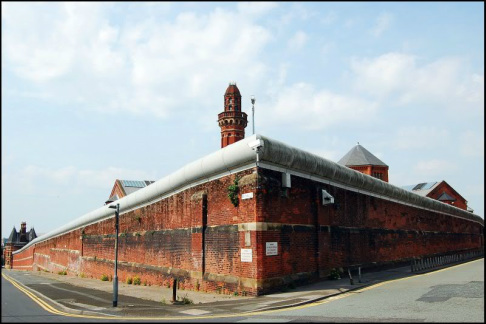
During the next ten minutes before Sean was escorted to HM Prison, Strangeways, where he would serve out his full sentence, Mr Black filled him in on what he had learned about Maxine's current whereabouts and circumstances.
The barrister told Sean that after his initial arrest, Maxine had apparently gone to pieces and had suffered a nervous breakdown. She was so depressed and overcome with grief that she was sectioned into a psychiatric ward on a twenty eight days' order within 48 hours of her mother's death. When her twenty eight days had expired, another section was applied for and granted as she was considered of unsound mind and unsafe to her person and others. The psychiatrist diagnosed Maxine as having suffered from a psychotic episode and said that she was also displaying the symptoms of catatonia, which was largely associated with the condition of a more severe type of schizophrenia. Maxine had stopped talking completely and spent the whole of her day sitting silently in her wheelchair inside the secure ward of the hospital, looking lifeless like a zombie. According to the information he and the prosecution counsel had received, she had been traumatised by the impact of her mother's death and carried a look of vacancy in her eyes. She was not even fit enough to attend her mother's funeral service and as far as the nurses and carers were concerned, she didn't even seem aware that her mother was being buried.
So as not to damage their case of obtaining a 'guilty' plea, the Prosecution withdrew Maxine as a witness that was required to be produced to give evidence and instead, they relied upon her initial police statement that she'd made on the evening of Sean's arrest. Given that her statement had already been accepted by the defence counsel and given her current psychiatric incarceration, it had not been felt either necessary or helpful to inform Sean as to her precise whereabouts and circumstances lest he became suicidal also.
Had Sean initially been granted bail, the police believed that he might have interfered with the process of justice by contacting the prosecution witness and attempting to get her to withdraw or change her initial police statement that supported his plea of guilty.
The barrister told Sean that after his initial arrest, Maxine had apparently gone to pieces and had suffered a nervous breakdown. She was so depressed and overcome with grief that she was sectioned into a psychiatric ward on a twenty eight days' order within 48 hours of her mother's death. When her twenty eight days had expired, another section was applied for and granted as she was considered of unsound mind and unsafe to her person and others. The psychiatrist diagnosed Maxine as having suffered from a psychotic episode and said that she was also displaying the symptoms of catatonia, which was largely associated with the condition of a more severe type of schizophrenia. Maxine had stopped talking completely and spent the whole of her day sitting silently in her wheelchair inside the secure ward of the hospital, looking lifeless like a zombie. According to the information he and the prosecution counsel had received, she had been traumatised by the impact of her mother's death and carried a look of vacancy in her eyes. She was not even fit enough to attend her mother's funeral service and as far as the nurses and carers were concerned, she didn't even seem aware that her mother was being buried.
So as not to damage their case of obtaining a 'guilty' plea, the Prosecution withdrew Maxine as a witness that was required to be produced to give evidence and instead, they relied upon her initial police statement that she'd made on the evening of Sean's arrest. Given that her statement had already been accepted by the defence counsel and given her current psychiatric incarceration, it had not been felt either necessary or helpful to inform Sean as to her precise whereabouts and circumstances lest he became suicidal also.
Had Sean initially been granted bail, the police believed that he might have interfered with the process of justice by contacting the prosecution witness and attempting to get her to withdraw or change her initial police statement that supported his plea of guilty.
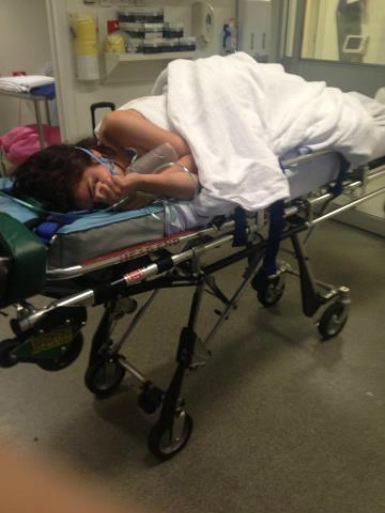
Sean was told that three months after her mother's funeral, Maxine was transferred from the Psychiatric Hospital in the Lancaster area down to the area of Aylesbury; where she could obtain her eventual treatment at The Stoke Mandeville Hospital in acquiring a new prosthesis as soon as her own mental health had improved.
This much, Sean's barrister had discovered from the Prosecution counsel today, but neither he nor the prosecution was aware of the simple fact that Maxine had lost all memory of both persons and events since the night of her mother's death. With regard to her relationship with Sean Fanning, Maxine had no memory of Sean. Indeed, she held no recollection of their time together or of their future plans. Maxine had seemingly mentally blocked out everything and everybody who'd been a part of her life before the night her mother had died.
"That's it, Sean," said his barrister. "That's all I know."
This much, Sean's barrister had discovered from the Prosecution counsel today, but neither he nor the prosecution was aware of the simple fact that Maxine had lost all memory of both persons and events since the night of her mother's death. With regard to her relationship with Sean Fanning, Maxine had no memory of Sean. Indeed, she held no recollection of their time together or of their future plans. Maxine had seemingly mentally blocked out everything and everybody who'd been a part of her life before the night her mother had died.
"That's it, Sean," said his barrister. "That's all I know."
|
Click here for the next page
|
Click here for the previous page
|
